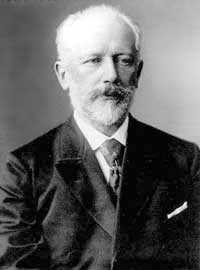Undina (Tchaikovsky)
Undina (sometimes Undine or Ondine) (Russian: Ундина) is an opera in 3 acts by Pyotr Ilyich Tchaikovsky. The work was composed in 1869. The libretto was written by Vladimir Sollogub, and is based on Vasily Zhukovsky's translation of Friedrich de la Motte Fouqué's Ondine.
| Operas by Pyotr Ilyich Tchaikovsky |
|---|
 |
|
History
The opera was composed during the months of January to July, 1869, but Tchaikovsky destroyed the score in 1873, preserving only a few numbers from the opera. The opera has never been performed in its entirety.
The only extracts that survive are:
- Introduction
- Aria: "Waterfall, my uncle, streamlet, my brother" (Undina)
- Chorus: "Help, help! Our stream is raging"
- Duet: "O happiness, O blessed moment" (Undina, Huldbrand)
- Chorus: "O hours of death" (soloists, chorus)
At least three of these pieces - the aria, the duet, and the final chorus - were performed at the Moscow premiere at the Bolshoi Theatre in Moscow on 28 March 1870.
Some music from the opera was subsequently re-used in Tchaikovsky's other works:
- The bridal procession of Act 3 was adapted for the Andantino marziale of his Symphony No. 2 "Little Russian" (1872).
- The introduction was used unchanged as the introduction to his incidental music to Ostrovsky's The Snow Maiden (1873).
- Undina's aria was somewhat altered and put to use as the first song of Lel in The Snow Maiden.
- The duet was recycled as the duet (No. 13-V) of Siegfried and Odette in Act 2 of Swan Lake (1875–1876). The vocal parts were replaced by solo cello and violin.
Roles
| Role | Voice type | Premiere cast March 28 [OS March 16], 1870 (Conductor: Eduard Merten)[1] |
|---|---|---|
| Goldmann, an old fisherman | bass | |
| Bertha, his wife | mezzo-soprano | |
| Undina, their adopted daughter | soprano | A. Alexandrova-Kochetova |
| Huldbrand, a knight | tenor | Aleksandr Dodonov |
| The Duke | bass | |
| Berthalda, the Duke's daughter | mezzo-soprano | |
| Chorus, silent roles: People | ||
Instrumentation
Source: Tchaikovsky Research
- Strings: Violins, Violas, Cellos, and Double Basses
- Woodwinds: Piccolo, 2 Flutes, 2 Oboes, 2 Clarinets ( B-flat), 2 Bassoons
- Brass: 4 Horns (all F), 2 Trumpets (B-flat), 2 Trombones, Tuba
- Percussion: Timpani, Triangle, Cymbals, Bass Drum
- Other: Harp, Piano
Setting
Time: The 15th century
Place: Germany, near the Danube; Ringstetten Castle (Burg Ringstetten)
Recordings
Vocal and Orchestral Numbers
- "Excerpts from the Opera Undine" Tamara Milashkina (Undine), Yevgeny Raikov (Gulbrand), Moscow Radio Chorus (Konstantin Lebedev, director), Moscow Radio Symphony Orchestra, Yevgeny Akulov, conductor. Melodiya / ABC Westminster Gold WGS 8300, 1975. LP.
Features three selections from Undina: Act I: Undine's Song; Act I: Finale; Act III: Duet of Undine and Gulbrand.
- "Undine: fragments from the unfinished opera" Tamara Milashkina (Undine), Yevgeny Raikov (Gulbrand), Moscow Radio Chorus, Moscow Radio Symphony Orchestra, Yevgeny Akulov. Melodiya, 1988. CD.
A CD reissue of the above LP, subsequently re-released by Mobile Fidelity Sound Lab (Petaluma, CA) in 1989. It features the same three selections as in the 1975 issue, plus the Introduction (Ouverture), with the Moscow Radio Symphony Orchestra conducted by Alexander Gauk.
- "Vodopad moy dyadya" from Undina, On Guilty Pleasures. Renée Fleming, soprano, Philharmonia Orchestra, Sebastian Lang-Lessing, conductor. London/Decca B0019033-02, 2013. CD.
- Undina: surviving fragments. Anna Aglatova (Undina), Aleksey Tataritsev (Gulbrand), Tchaikovsky Symphony Orchestra and Chorus of the Popov Academy of Choral Arts, Vladimir Fedoseyev, conductor. Published YouTube 23 November 2015.
Concert performance of all five surviving numbers, including the previously unrecorded Bridal March, recorded 13 November 2015 at the Tchaikovsky Concert Hall in Moscow, with Mikhail Fillipov reciting extracts from Zhukovsky's story.
References
- Eduard Merten became 2nd conductor at the Bolshoi Theatre shortly before 1870. He was "a talented pianist and composed romances, but was completely inexperienced as a conductor" (Kashkin, Erinerrungen, 64, 66) Edward H. Tarr, East Meets West: The Russian Trumpet Tradition from the Time of Peter the Great
External links
- Ундина: Scores at the International Music Score Library Project (IMSLP)
- Tchaikovsky Research